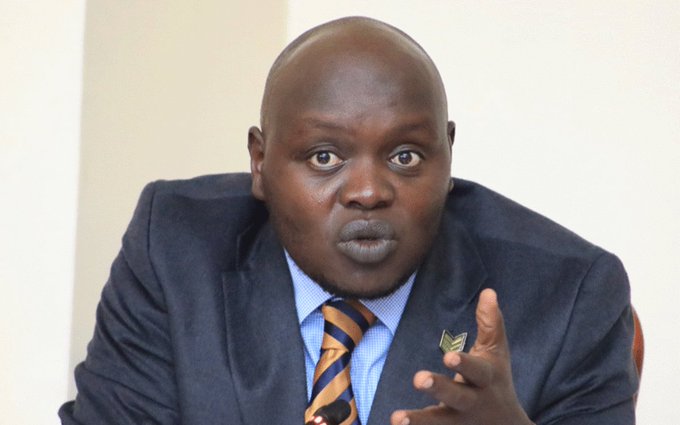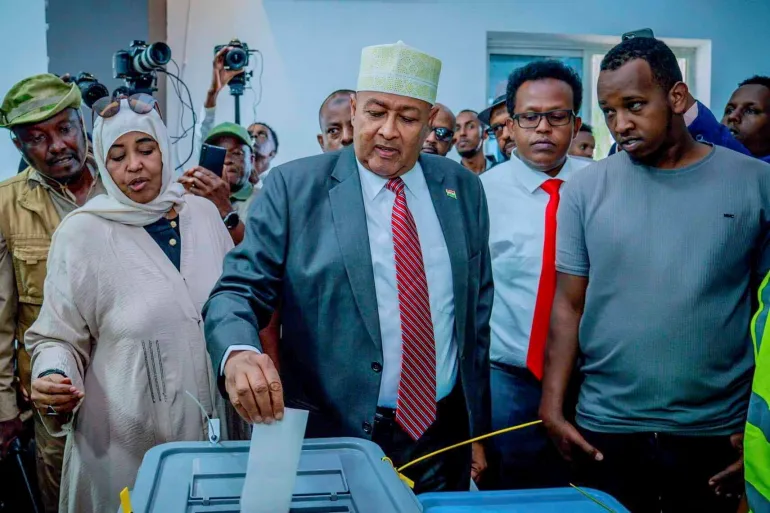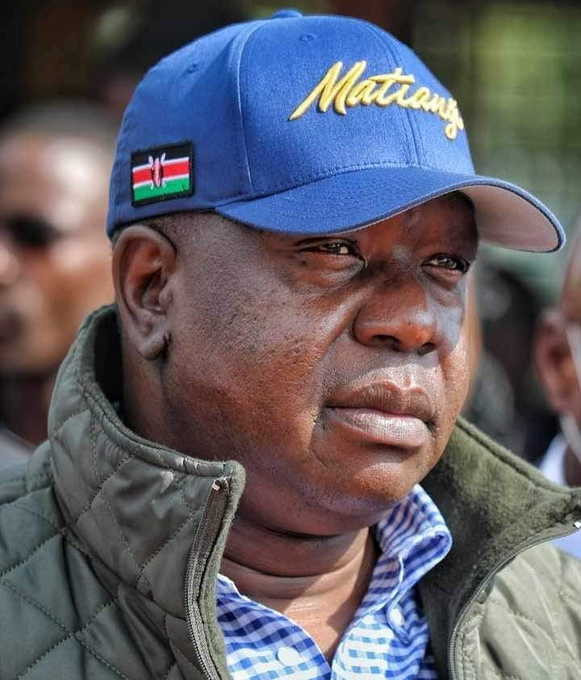Politics
Cherargei’s Bill for Kenya Presidential Term Extension Faces UDA Backlash
Many Kenyans have expressed strong opposition to the bill, fearing it could undermine the country’s democratic principles.

:Senator Samson Cherargei, a key figure in the United Democratic Alliance (UDA) and a close ally of President Ruto, contends that the current five-year presidential term is inadequate for fully implementing a leader’s agenda, particularly given the electoral disputes that frequently disrupt governance stability.
By Charles Wachira
Senator Samson Cherargei of Kenya is proposing a bill, aimed at extending the presidential term from five to seven years and the idea has ignited controversy, with critics alleging it’s a ploy to prolong President William Ruto’s rule.
Cherargei, a member of the United Democratic Alliance (UDA) closely aligned with Ruto, argues that the current five-year term isn’t sufficient for presidents to effectively implement their agendas, especially considering electoral disputes that often delay governance stability.
“Seven years will provide ample time for a president to deliver on their manifesto,” Cherargei defended during the bill’s Senate reading. He emphasized that frequent elections disrupt long-term development projects crucial for national growth.
This isn’t Cherargei’s first attempt at such reforms.
Similar proposals were previously rejected by the public through the National Dialogue Committee co-led by Ruto and opposition leader Raila Odinga in 2023. Now reintroduced, the bill also seeks to extend terms for MPs and governors to seven years and introduces the role of a prime minister appointed by the president.
Francis Chege from the former ruling Jubilee Party views the bill as a maneuver to benefit the political elite rather than the public interest.
“These proposals favour the political class and not the people,” Chege criticized.Adding that the move is “a plot to extend Ruto’s rule,” saying that the government may be “testing the waters” through such proposals to gauge public reaction. “This is about power consolidation, not the people,” Chege added, echoing the views of many who see the proposal as a threat to democratic accountability.
In contrast, Eugene Otieno, a history teacher, supports the concept but advocates for a single seven-year term to reduce political motivations.
“A single term would make the presidency less about re-election and more about governance,” Otieno suggested, stressing the need for extensive public consultation on such constitutional changes.
. “A single term will make the presidency less attractive for those looking to stay in power for personal gain,” Otieno said. He believes that a one-term presidency could allow a leader to focus on governance without being distracted by re-election campaigns, but insists on thorough public consultations before any changes are made.
Many Kenyans have expressed strong opposition to the bill, fearing it could undermine the country’s democratic principles.
Social media platforms and local talk shows have seen an outpouring of criticism, with citizens arguing that extending terms would likely lead to complacency, weakened checks on government performance, and potentially a rollback of democratic gains achieved over the past two decades.
A common refrain among opponents is that Kenyan politicians are trying to “change the rules of the game” to suit their own interests once in power.
At the grassroots level, many Kenyans are also frustrated with the slow pace of governance, which they attribute more to political inefficiency and corruption than the length of the president’s term.
Extending the term to seven years is seen by some as a distraction from addressing pressing issues such as unemployment, inflation, and the high cost of living.
Political analysts like Carol Situma argue that the timing of the proposal is highly suspect, especially given the economic challenges Kenya is facing.
Situma calls it “a diversionary tactic” designed to shift public attention away from more pressing issues, such as rising public debt, ongoing disputes over privatization deals, and unfulfilled promises by the Ruto administration.
Overall, public sentiment reflects a deep skepticism of the bill. Many citizens view it as an unpopular attempt to manipulate the constitution for political gain, and the likelihood of widespread public protests or backlash is high if the proposal gains traction in Parliament. Moreover, the memory of Kenya’s long struggle for constitutional reform and democracy makes many wary of an
The timing and intent behind Cherargei’s bill have sparked skepticism among analysts.
When reached for comment, UDA officials remained inaccessible. However, in previous statements, the party has distanced itself from Cherargei’s proposals, asserting their commitment to the existing constitutional framework.
“The UDA respects differing opinions, but these views do not reflect our party’s stance or that of our leader, President William Ruto,” a UDA spokesperson clarified in response to earlier similar attempts by Cherargei.
As the bill undergoes committee scrutiny in the Senate, its fate hinges on public feedback and legislative debate, with significant implications for Kenya’s political landscape if passed.
What’s Ruto’s position?
President Ruto has so far remained officially non-committal on the bill However, through his party, the United Democratic Alliance (UDA), Ruto has distanced himself from previous attempts by Cherargei to amend the constitution for similar reasons.
In 2023, Cleophas Malala, then Secretary General of UDA, made it clear that the party did not endorse such proposals. Malala emphasized that any changes to the presidential term would require a referendum, adding that President Ruto was committed to upholding the current five-year term limit as enshrined in the constitution.
“The president remains focused on delivering his development agenda within the mandate given by the people of Kenya, and he has no intention of pushing for constitutional amendments to extend his term,” Malala said at the time, addressing concerns that Cherargei’s proposal might represent the party’s position.
While Ruto has not publicly commented on Cherargei’s latest bill, the official stance of the UDA suggests the president is wary of being associated with proposals that may be seen as attempts to prolong his rule. Ruto has previously emphasized his commitment to constitutionalism and respecting democratic institutions, which include adhering to the two-term limit for the presidency.
If the bill passes, it could create a political storm. Extending the presidential term might embolden Ruto’s critics, who could accuse him of trying to entrench himself in power.
It could also lead to widespread public opposition, similar to the backlash against earlier attempts at constitutional changes.
Additionally, the introduction of a prime ministerial position could reshape Kenya’s governance structure and centralize more power within the presidency, potentially heightening tensions between the executive and other political forces.
For now, the bill is seen as Cherargei’s initiative, but its progress will undoubtedly place Ruto in a delicate position. He may be forced to publicly clarify his position if pressure mounts, especially as public consultations and Senate debates unfold.
:
What do experts say?
Experts have weighed in on Senator Cherargei’s proposal to extend the presidential term from five to seven years, and their views reflect a deep concern over the potential impact on Kenya’s democratic system.
Political analysts, constitutional scholars, and governance experts generally see the move as a threat to Kenya’s democratic principles and a shift toward consolidating power, rather than a genuine attempt to improve governance.
- Threat to Democratic Gains: Many experts argue that extending the presidential term would undermine the democratic progress Kenya has made since the introduction of the 2010 Constitution, which set clear limits on presidential power. Constitutional law expert Dr. Duncan Ojwang highlights that term limits are designed to prevent the concentration of power and ensure regular, peaceful transitions of authority. “Term limits are essential for democracy. Extending the presidential term sets a dangerous precedent that could erode Kenya’s democratic culture,” he explained. According to Ojwang, removing or altering these limits could encourage future leaders to manipulate the system in their favor.
- Power Consolidation Fears: Several analysts, including political scientist Dr. Peter Kagwanja, see Cherargei’s bill as a veiled attempt to consolidate power within the ruling party, potentially making it harder for opposition forces to compete in elections. Kagwanja argues that the introduction of a prime ministerial position in the bill could give the president more control over Parliament, which could weaken checks and balances in government. “The proposal, especially with the prime minister’s office, centralizes power within the executive, raising the risk of an autocratic system,” he stated.
- A Diversion from Real Issues: Some analysts, such as Carol Situma, view the proposal as a political distraction. Situma describes the timing of the bill as suspicious, given that Kenya is currently grappling with major economic challenges, including inflation and high public debt. “This is a diversionary tactic by the ruling party to shift attention away from the real issues affecting Kenyans,” Situma observed. She adds that instead of focusing on electoral reforms, the government should prioritize addressing urgent concerns like unemployment, poverty, and governance inefficiencies. “The conversation should be about delivery of services, not extending terms.”
- Governance Impact: Experts in governance, such as Professor Macharia Munene, believe that extending the term limit may not necessarily result in better governance or development outcomes. He points out that five years is a reasonable period for a president to lay the groundwork for major projects, and if progress is slow, it often reflects poor management rather than insufficient time. “It’s not the length of the term that determines success, but the effectiveness of leadership and implementation,” Munene said. He also raised concerns that longer terms could encourage complacency among elected officials, reducing the urgency to deliver on campaign promises.
- Political Instability Risks: Constitutional lawyer Dr. Linda Musumba warns that changing the presidential term limit could spark political instability and lead to protests, as it might be seen as undermining the will of the people. “Attempts to alter key constitutional provisions without broad public support could lead to a political crisis,” Musumba cautioned. She emphasized that the Kenyan public is highly sensitive to any moves that could be interpreted as power grabs, particularly given the history of contested elections and street protests.
- Public Participation and Referendum: Experts across the board agree that any attempt to amend the Constitution, especially regarding presidential terms, must involve extensive public participation and likely a referendum. Dr. Samuel Nyikal, a constitutional scholar, emphasized that constitutional amendments of this magnitude cannot be left to Parliament alone. “These are issues that directly affect the people, and they must have a say. A referendum would be the legitimate way to resolve such matters,” Nyikal stated, echoing sentiments expressed by many civil society groups and legal experts.
In summary, experts overwhelmingly caution against extending the presidential term, citing risks to democratic principles, political stability, and governance quality. They recommend that the government focus on addressing Kenya’s pressing socio-economic issues rather than pursuing controversial constitutional amendment
Keywords: Kenya presidential term extension:Samson Cherargei bill controversy:Ruto administration power consolidation:UDA stance on term limits:Kenyan public opposition to term extension
Politics
Martha Karua’s Memoir: A Journey of Leadership and Resilience

: Discover Martha Karua’s memoir, Against the Tide, as she reflects on her
political career, struggles, and triumphs in Kenya’s fight for justice and
leadership.
Martha Wangari Karua, born on September 22, 1957, in Kirinyaga District, launched her
memoir, Against The Tide, on Sunday, November 17, 2024.
This memoir, the culmination of nine years of writing, offers an insightful and personal
look into Karua’s remarkable journey as a lawyer, activist, and politician.
Known for her staunch advocacy for justice, tireless efforts against corruption, and bold
leadership, Karua has become one of Kenya’s most respected political figures.
“Writing this book has been a labour of love; the love I have for my country
and its people, the struggles I have endured, and the unwavering
commitment to building a better Kenya,” Karua shared at the launch,
reflecting on the challenges and triumphs that have defined her career.
A Curious Childhood and Early Inspirations
Growing up in Kimunye village, Karua’s inquisitiveness often led her to challenge the
status quo. Despite being a source of concern for her parents—both teachers—her
curiosity became the foundation of her intellectual pursuits.
“My close family had been supportive and patient, my dad and teachers
exhibited patience with me,” Karua recalls.
Her father, a prominent figure in her early life, sparked Karua’s interest in law,
particularly after she accompanied him to court as a child and became fascinated by the
respect magistrates commanded.
“When I was in primary school, I accompanied my dad to court on a traffic
matter. We had gone to Kerugoya, then we passed by the court. I liked the
attention the magistrate was getting, and upcountry they were being called
‘Judge,’” she explains.
Karua’s education at Nairobi Girls’ School fostered her independence, where she was
encouraged to express her opinions freely—a crucial factor in the development of her
leadership qualities.
Political Awakening
Karua’s political activism began within the Law Society of Kenya (LSK), where she and
other members challenged government excesses. This marked the beginning of her
deep commitment to national change.
“I realised that just as I had in the law society activism, it’s not enough to
complain about what is not being done.
It’s also important to get there and do what you think should be done. I was
seeking to be a part of the solution,” she explained.
Her decision to join active politics in 1992 led to her election as the Member of
Parliament (MP) for Gichugu, a position she held for four terms.
This transition marked her rise to national prominence, where she became renowned
for her principles, adherence to the rule of law and advocacy for women’s rights. Over
time, her steadfast nature earned her the nickname “The Iron Lady.”
From Law School to Legal Practice
Karua’s passion for law drove her to the University of Nairobi, where she earned her law
degree in 1980 and was admitted to the bar in 1982.
At just 24 years old, she began her career as a magistrate. However, financial
constraints led her to private practice in 1987, where she grew her firm, Martha Karua &
Co. Advocates, and advocated for human rights during Kenya’s politically turbulent
years under President Daniel arap Moi.
“When I entered the judiciary as a magistrate, I was earning Sh3,000. When
I got a family, the salary was not good enough,” Karua explains.
Her work in public service and private practice led to her being conferred Senior
Counsel 38 years later, following a career marked by significant legal accomplishments.
A Pivotal Role in the 2007 Election Crisis
In her memoir, Karua recounts the dramatic aftermath of the 2007 elections, when the
Electoral Commission of Kenya declared Mwai Kibaki the winner amid accusations of
fraud.
Despite widespread protests from the opposition, led by Raila Odinga, Karua took
immediate action to ensure Kibaki was sworn in.
The swearing-in ceremony, held on December 30, 2007, took place at State House,
Nairobi, despite the chaotic situation.
“The swearing-in had to be done immediately. Kibaki was declared the winner, and
according to the Inter-Parties Parliamentary Group (IPPG) amendment, the President
was to be sworn in as soon as he was declared,” Karua explained.
The action was necessary, she asserted, to maintain order during a tense political
period.
“How else could the swearing-in have been conducted? It was vital to swear
him in immediately,” she added.
Despite the political turmoil, Karua stands by her decision:
“I did what was right, and I stand by that decision. Even tomorrow, I will do
what is right. I have no regrets about the role I played as Kibaki’s agent and
the vote I cast for him,” she said.
However, the aftermath of the election saw post-election violence, which led to tribal
clashes, destruction, and loss of life. Karua expressed regret for the violence that
followed:
“We regret the loss of life, the destruction of property, and the displacement
of people. We also regret our failure as leaders, which could have led the
country into an abyss.”
Lessons from Leadership and Regrets
In her memoir, Karua reflects candidly on her political journey, including her decision to
run for president in 2012, which she now considers a misstep.
“The people of Gichugu elected me. I believe if I had gone for the
parliamentary seat instead of the presidency in 2012 or any local seat, I
would still be elected. I had bitten more than I could chew,” she admits.
Despite the loss, Karua stands firm in her principled approach to politics, particularly
during the constitutional review under President Mwai Kibaki’s administration.
“The issue of refusing to anchor the agreement in the Constitution was
pivotal. Kibaki wanted to accommodate Raila and his group in government
but still retain the ability to appoint and fire just like before. However, Raila and his group, having been fired in 2005, wanted it enshrined in the Constitution,” she explains.
A Legacy of Resilience
Karua’s story is not just one of triumph, but also resilience in the face of adversity,
including losses and betrayals. Reflecting on her journey, she writes:
“Thirty-eight years later, I was conferred to the rank of Senior Counsel
following an illustrious career in public service and private practice,
successfully arguing cases that have set legal precedence. It has not been
easy. I have faced each tide that has come my way and overcome.”
Against The Tide: A Testament of Courage
This memoir, which took nearly a decade to complete, stands as a testament to Karua’s
unwavering resolve to confront challenges head-on.
For anyone seeking inspiration from one of Kenya’s most iconic leaders, Against The
Tide offers a story of resilience, leadership, and the relentless pursuit of justice.
“Against The Tide is about overcoming adversity. It’s about resilience,”
Karua declared.
Politics
Somaliland Elects Opposition Leader Irro as New President

:Abdirahman Irro wins Somaliland’s 2024 presidential election with 64% votes,
signalling change. Over 1M registered voters participated peacefully
Somaliland’s presidential election, held on November 13, 2024, resulted in a decisive victory for Abdirahman Mohamed Abdullahi Irro of the Wadani Party.
Preliminary results indicated that Irro received approximately 64% of the votes, with Muse Bihi Abdi, the incumbent president from the Kulmiye Party, trailing at 35%.
The third candidate, Faysal Ali Warabe of the UCID Party, garnered less than 1% of the votes.
This election, initially scheduled for 2022, faced delays due to economic and political challenges but proceeded peacefully with over 1 million registered voters participating in over 2,000 polling stations.
Key Issues and Electoral Dynamics
The election was a referendum on governance, with voters expressing dissatisfaction with Muse Bihi Abdi’s administration, particularly regarding economic stagnation, rising unemployment, and issues of democratic space.
Irro’s Wadani Party campaigned on promises of economic reforms, improving international
recognition for Somaliland, and fostering greater inclusivity in governance.
Voter Turnout and Observations
Despite logistical challenges, approximately 680,000 voters cast their ballots. Observers from
ten nations praised the National Electoral Commission (NEC) for conducting a transparent
process.
No major security incidents were reported, showcasing Somaliland’s commitment to democratic principles.
Significance of the Win
Irro’s victory marks a significant shift in Somaliland’s political landscape.
As the leader of the opposition, his administration is expected to focus on addressing
longstanding economic and social grievances while seeking greater international legitimacy forSomaliland, which has remained diplomatically isolated since declaring independence in 1991.
The peaceful transfer of power further reinforces Somaliland’s reputation as a beacon of
democracy in the Horn of Africa The official results are expected to be announced by November 21, 2024, cementing Irro’s position as Somaliland’s new
Politics
Fred Matiang’i Hires Canadian Firm Dickens & Madson for 2027 Bid

: Fred Matiang’i partners with Dickens & Madson for $250K to boost his 2027
presidential campaign, focusing on lobbying and strategic global support.
Former Kenyan Interior Cabinet Secretary Fred Matiang’i has taken a bold step toward the 2027 presidential race by hiring Canadian lobbying firm Dickens & Madson. The firm, led by
controversial political consultant Ari Ben-Menashe, signed an agreement with Matiang’i on July 13, 2024. The deal reportedly involves a $250,000 (about KSh 32 million) fee, covering services designed to build international support for Matiang’i’s political ambitions over the coming years.
Scope of Services
Dickens & Madson is tasked with lobbying influential governments, including the U.S., U.K., and Japan, and international organisations to align them with Matiang’i’s bid. Their deliverables also include formulating strategies to enhance his political campaign and improve his global image.
This approach mirrors the firm’s previous engagements, where they used diplomatic channels to influence policies and secure favourable positions for their clients.
Previous Work
The firm is no stranger to high-profile and often controversial political campaigns. It has worked with Zimbabwean President Emmerson Mnangagwa to promote land deals and improve Zimbabwe’s international standing. Dickens & Madson’s client portfolio also includes various governments and individuals facing sanctions or international scrutiny, highlighting their reputation for navigating complex geopolitical terrains.
Implications for 2027
Matiang’i’s decision to engage a firm with such a record underscores his intention to leverage
international networks to counter President William Ruto’s administration.
While the move signals strategic ambition, it also invites scrutiny, given the firm’s controversial history and the polarised perception of Matiang’i’s leadership legacy This development sets the stage for a high-stakes election, as Matiang’i aims to position himself as a credible alternative to Ruto, drawing on both local and international support to bolster his campaign.
-

 Business & Money8 months ago
Business & Money8 months agoEquity Group Announces Kshs 15.1 Billion Dividend Amid Strong Performance
-

 Politics3 months ago
Politics3 months agoFred Okengo Matiang’i vs. President William Ruto: A 2027 Election Showdown
-

 Politics2 months ago
Politics2 months agoIchung’wah Faces Mt. Kenya Backlash Over Gachagua Impeachment Support
-

 Politics4 months ago
Politics4 months agoPresident Ruto’s Bold Cabinet Dismissal Sparks Hope for Change
-

 Politics5 months ago
Politics5 months agoKenya Grapples with Investor Confidence Crisis Amid Tax Protest Fallout
-

 Politics5 months ago
Politics5 months agoPresident Ruto’s Lavish Spending Amid Kenya’s Economic Struggles Sparks Outrage
-

 Politics4 months ago
Politics4 months agoJohn Mbadi Takes Over Kenya’s Treasury: Challenges Ahead
-

 Business & Money1 week ago
Business & Money1 week agoMeet Kariuki Ngari: Standard Chartered Bank’s new CEO of Africa. What’s Next?





